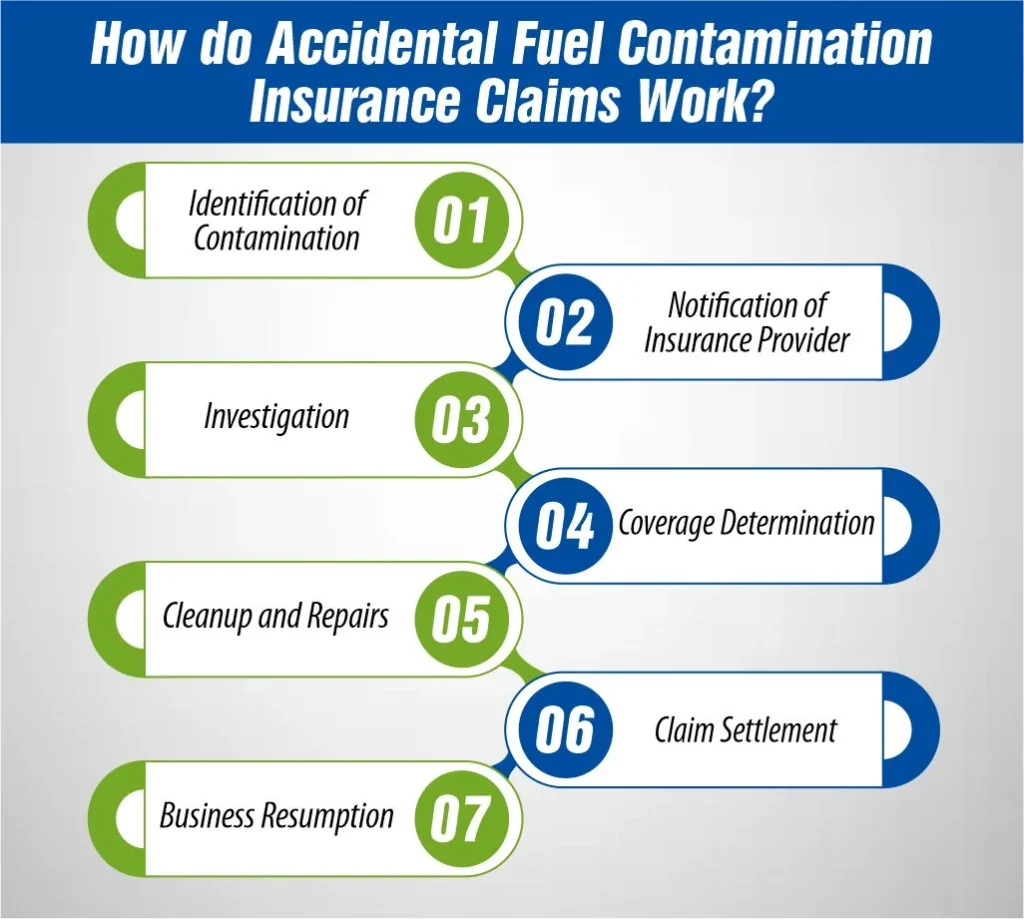Do you know what could happen if your business falls victim to accidental fuel contamination? Imagine the chaos that could ensue if your fuel supply suddenly becomes contaminated with water, dirt, or other substances. Not only could it disrupt your operations, but it could also lead to significant financial losses.
Thank you for reading this post, don't forget to subscribe!Accidental fuel contamination is a serious concern for businesses that rely on fuel for their operations. However, with the right insurance coverage, you can protect your business from the potentially devastating consequences of fuel contamination. Accidental fuel contamination insurance can provide coverage for cleanup costs, repair expenses, business interruption, and liability claims that may arise from a contamination incident.
In this article, we’ll take a closer look at accidental fuel contamination insurance claims, how they work, and why they’re important for businesses that handle fuel. Let’s dive in!
What is Accidental Fuel Contamination?
Accidental fuel contamination is a serious issue that can have significant consequences for businesses. It occurs when foreign substances, such as water, dirt, or other chemicals, mix with fuel. This contamination can happen at any stage of the fuel supply chain, from storage and transportation to handling and usage.
There are several common causes of accidental fuel contamination, including leaking storage tanks, improper fuel handling procedures, and environmental factors such as floods or spills. Regardless of the cause, the presence of contaminants in fuel can lead to a range of problems, including damage to equipment, vehicles, and machinery, as well as environmental damage and health risks.
Businesses that handle fuel should be aware of the risks associated with accidental fuel contamination and take steps to mitigate these risks. This includes implementing proper storage and handling procedures, conducting regular inspections and maintenance, and investing in insurance coverage to protect against the financial consequences of a contamination incident.
The Importance of Accidental Fuel Contamination Insurance
Accidental fuel contamination insurance is a crucial protection for businesses that handle fuel. This type of insurance provides coverage for the costs associated with cleaning up contaminated fuel and repairing any damage caused by the contamination. It can also cover the costs of business interruption, liability claims, and legal expenses that may arise from a fuel contamination incident.
One of the key benefits of accidental fuel contamination insurance is financial protection. Cleaning up contaminated fuel and repairing any damage can be extremely costly, and without insurance coverage, these costs can quickly add up and potentially bankrupt a business. Accidental fuel contamination insurance provides businesses with the financial protection they need to recover from a contamination incident without facing significant financial hardship.
Another important benefit of accidental fuel contamination insurance is business continuity. In the event of a contamination incident, businesses may be forced to shut down operations while the contamination is cleaned up and repairs are made. This can result in significant downtime and loss of revenue. Accidental fuel contamination insurance can help businesses resume operations quickly by covering the costs of cleanup and repairs, reducing downtime and minimizing the impact on revenue.
Accidental fuel contamination insurance also provides legal protection. If a contamination incident leads to liability claims or legal action, accidental fuel contamination insurance can cover the costs of defending against these claims. This can provide businesses with peace of mind knowing that they are protected against potential legal challenges arising from a contamination incident.
 How do Accidental Fuel Contamination Insurance Claims Work?
How do Accidental Fuel Contamination Insurance Claims Work?
Accidental fuel contamination insurance claims typically follow a straightforward process:
1- Identification of Contamination
The first step is to identify that a fuel contamination incident has occurred. This may involve noticing unusual behavior or performance issues in equipment or vehicles that use contaminated fuel.
2- Notification of Insurance Provider
Once the contamination is identified, the business should notify their insurance provider as soon as possible. They will need to provide details of the incident, including when and how it occurred.
3- Investigation
The insurance provider will investigate to determine the cause and extent of the contamination. This may involve inspecting the site where the contamination occurred, analyzing samples of the contaminated fuel, and reviewing any relevant documentation.
4- Coverage Determination
Based on the investigation findings, the insurance provider will determine if the contamination is covered under the policy. If it is, they will outline the coverage limits and any conditions that apply.
5- Cleanup and Repairs
Once coverage is confirmed, the business can proceed with cleaning up the contaminated fuel and repairing any damage caused by the contamination. The insurance provider will cover the costs of these activities up to the policy limits.
6- Claim Settlement
Once the cleanup and repairs are complete, the business can submit a claim for reimbursement of the covered expenses. The insurance provider will review the claim and settle it according to the terms of the policy.
7- Business Resumption
With the cleanup and repairs completed and the claim settled, the business can resume operations as usual, knowing that they are protected against the financial impact of the contamination incident.
How Much Does Life Isurance Cost?
Overall, accidental fuel contamination insurance claims aim to provide businesses with the financial support they need to recover from a contamination incident and resume operations quickly and smoothly.
Key Steps in Filing Accidental Fuel Contamination Insurance Claims
Filing accidental fuel contamination insurance claims involve several key steps:
-
Immediate Response and Documentation
When faced with a fuel contamination incident, swift action is key. Immediately notify your insurance provider and accurately document the event’s details, including the date, time, and circumstances of the contamination. Comprehensive documentation is crucial for a successful claim.
-
Contact Your Insurance Provider
Reach out to your Accidental Fuel Contamination Insurance provider promptly to kickstart the claims process. Furnish them with all pertinent information and be prepared to address any inquiries they may have about the incident. Timely communication helps streamline the claims procedure.
-
Collaborate with Experts and Specialists
Engage closely with environmental experts and specialists who can assess the contamination’s extent and recommend suitable cleanup measures. Having their reports and assessments will bolster your insurance claim, validating the necessity of the expenses incurred.
-
Keep Detailed Records of Expenses
Maintain detailed records of all expenses linked to cleanup, repairs, and replacements stemming from the fuel contamination. This encompasses invoices, receipts, and any other pertinent documentation. Thorough record-keeping is pivotal for the claims adjuster’s assessment.
-
Cooperate with the Claims Adjuster
Your insurance provider will assign a claims adjuster to evaluate damages and assess the claim’s validity. Cooperate fully with the adjuster, providing all requisite information and access to affected areas. Transparent and timely collaboration expedites the claims process.
-
Review Your Insurance Policy
Familiarize yourself with the specific coverage details outlined in your Accidental Fuel Contamination Insurance policy. Understanding the terms, limits, and exclusions aids in managing expectations and ensures a smoother claims process.
-
Resolution and Compensation
Upon completion of the claims adjuster’s evaluation, your insurance provider will determine the compensation amount based on your policy’s coverage. This sum will reimburse documented expenses incurred during the cleanup and recovery efforts.
Benefits of Accidental Fuel Contamination Insurance Claims
Accidental fuel contamination insurance claims offer several key benefits to businesses that handle fuel:
1- Financial Protection
Cleanup and repair costs after a contamination incident can be substantial. Accidental fuel contamination insurance helps cover these expenses, protecting businesses from financial strain.
2- Business Continuity
Contamination incidents can disrupt operations, leading to downtime and revenue loss. With insurance coverage, businesses can quickly recover, minimizing disruptions and maintaining business continuity.
3- Legal Coverage
Accidental fuel contamination can result in legal liabilities, such as environmental damage or third-party claims. Accidental fuel contamination insurance includes liability coverage, helping businesses manage legal expenses.
4- Compliance Assistance
Some industries and locations require businesses to have accidental fuel contamination insurance. Having this coverage ensures compliance with regulations, avoiding potential penalties.
5- Risk Management
Accidental fuel contamination insurance is an essential part of a comprehensive risk management strategy. It helps businesses mitigate the financial risks associated with contamination incidents, providing a safety net for unforeseen events.
Accidental fuel contamination insurance claims provide businesses with valuable protection against the financial and operational impacts of fuel contamination incidents. By investing in this coverage, businesses can safeguard their assets, reputation, and bottom line.
The Bottom Line
In the end, accidental fuel contamination insurance claims are a crucial safeguard for businesses that handle fuel. They provide financial protection against cleanup and repair costs, ensure business continuity by minimizing downtime, and offer legal coverage for liability claims.
Additionally, this insurance assists in compliance with regulations and serves as a vital component of a comprehensive risk management strategy. By investing in accidental fuel contamination insurance, businesses can protect their assets, maintain operations, and mitigate the financial and operational risks associated with fuel contamination incidents.
FAQs about Accidental Fuel Contamination Insurance Claims
1- Does accidental fuel contamination insurance cover all types of fuel contamination?
Accidental fuel contamination insurance typically covers a wide range of fuel contamination incidents, including those caused by water, dirt, and other substances. However, the specific coverage may vary depending on the policy and the insurance provider.
2- Is accidental fuel contamination insurance mandatory for businesses that handle fuel?
While accidental fuel contamination insurance is not always mandatory, it is highly recommended for businesses that handle fuel. It provides essential financial protection against the potentially devastating consequences of fuel contamination incidents.
3- Can accidental fuel contamination insurance help with regulatory compliance?
Yes, accidental fuel contamination insurance can assist businesses in meeting regulatory requirements related to fuel handling and environmental protection. Having this insurance coverage can demonstrate a commitment to compliance and responsible business practices.
4- Are there any limitations to accidental fuel contamination insurance coverage?
Like any insurance policy, accidental fuel contamination insurance may have limitations and exclusions. It’s important to review the policy carefully to understand what is covered and what is not.
5- How long does it take to process an accidental fuel contamination insurance claim?
The time it takes to process an accidental fuel contamination insurance claim can vary depending on the complexity of the incident and the insurance provider. However, insurance companies typically aim to process claims as quickly as possible to minimize disruptions to businesses.
6- Can accidental fuel contamination insurance cover the costs of preventive measures?
Accidental fuel contamination insurance is primarily designed to cover the costs of cleanup and repair after a contamination incident. However, some policies may also cover the costs of preventive measures, such as regular inspections and maintenance, to reduce the risk of contamination.
7- What should businesses do if they suspect fuel contamination but are not sure?
If a business suspects fuel contamination but is not sure, it’s important to take immediate action to investigate the issue. This may involve conducting tests on the fuel or consulting with environmental experts. If contamination is confirmed, the business should notify their insurance provider and follow the necessary steps to address the contamination.
References:
https://www.progressive.com/answers/car-insurance-and-accidental-fueling/

Joyce Espinoza, Expert Life Insurance Agent
Joyce Espinoza is a trusted life insurance agent at mLifeInsurance.com. She’s been in the insurance industry for over ten years, helping people, especially those with special health conditions to find the right coverage. At MLife Insurance, Joyce writes easy-to-understand articles that help readers make smart choices about life insurance. Previously, she worked directly with clients at Mlife Insurance, advising nearly 3,000 of them on life insurance options.




